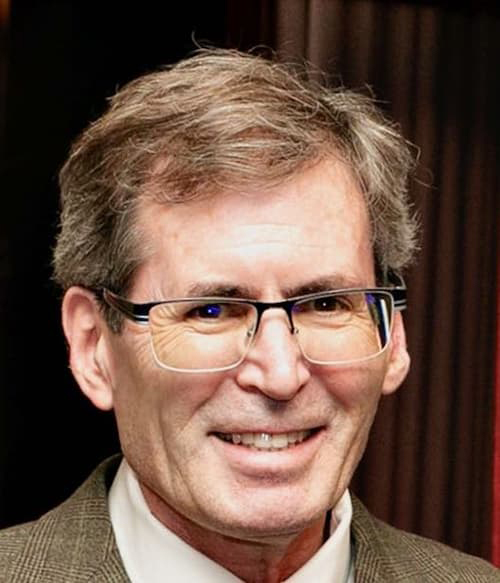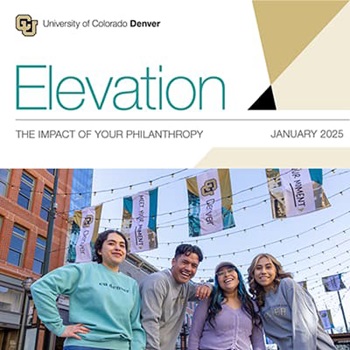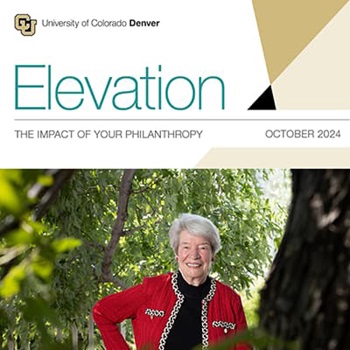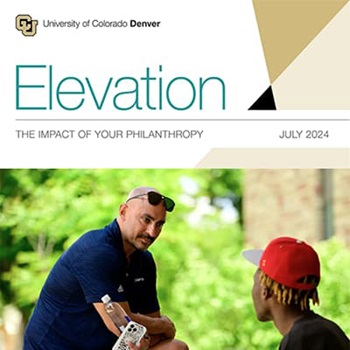A Testament to Second Chances
One donor’s remarkable journey leads to an enduring connection with CU Denver’s Health Administration program
Jackson Campbell | Office of Advancement Apr 3, 2024
Dr. Robert “Bob” Wolfson, a CU Denver alum, donor, and retired professor, is hailed by his former students, mentors, and colleagues alike for his love of education, his unwavering belief in his students, and his inherent desire to make the world a better place. But Bob’s time at the university did not begin until 15 years into an already successful career as a surgeon. Diagnosed with multiple sclerosis, he found himself no longer able to perform surgery. In search of a new path, the CU Denver Business School introduced Bob to an opportunity that added 20 years to his otherwise sunsetting career. Bob's story is not only an incredible tale of overcoming adversity but also a testament to second chances, the power of higher education to help make them possible, and the joy of giving back to help future generations.
Discovering His Passion
Long before his diagnosis, Bob’s first year in college was dedicated to pursuing a music degree. A talented drummer, he managed to earn a spot in Colorado’s All-State band in high school after just a few years of playing. This impressive feat earned him a Boettcher Scholarship, which would pay for his first year of college at any school in the state. Bob chose CU Boulder as he was currently in a rock band local to the city. But after playing a few games in the school’s marching band, he realized that music was not where he wanted to focus his career. He looked back at his other interests and recalled that before he had been mesmerized by musical talents of the time like The Beatles and The Rolling Stones, Bob had always wanted to be a doctor like his father before him.

Redeclaring himself a biochemistry major in the middle of his freshman year, Bob (pictured at right) found his new career angle, while heavily demanding, to be much more enjoyable for him. He earned his bachelor’s degree in 1974 and began attending medical school at CU, discovering a particular passion of his that would continue to develop over the next several years of his career. “I graduated with an award in surgery. [My professors] said I had promise as a surgeon, so I said ‘okay,’” Bob chuckled. “So, I applied for a surgical residency, which, again, I did at the University of Colorado.” Bob spent five years in residency learning how to be a surgeon and graduated in 1984, opening up his own practice the very same year.
Specializing in general, vascular, and trauma surgery, Bob was pleased with his hard-earned line of work and thriving practice, and it showed in his phenomenal work over a fifteen-year long career. “Dr Wolfson was an empathetic and humorous surgeon that really cared, not only about his patients, but also about all the people he came in contact with. This includes patients' families, hospital staff and employees,” says Bryan Baer, who worked with Bob both as a surgical resident and a coworker. “He always had a good word for everyone. When others got stressed and had negative responses, Bob was calm and used humor to deal with the stress. He was a very skilled and knowledgeable surgeon.”
A Chance Encounter Leads Back to School
But Bob’s time as a surgeon was cut short when he was diagnosed with multiple sclerosis (MS), a neurological condition that disrupts the brain’s communication to the body. For Bob, the diagnosis was not as severe as it could have been, but it still resulted in low vison, shaky hands, and, unfortunately, the end of his surgical career. What followed was a shift between different career paths, largely focused on the administrative side of medicine. “I didn’t want to do those things. I really wanted to be a surgeon,” he said, recalling his desire to be passionate about his work. While working as the Director of IT at Denver Health, Bob attended a conference where he met a professor of Health Administration at the CU Denver Business School; a chance encounter which led him to enroll in the program to earn his fourth degree in the CU system.
“CU Denver is special to me because when I got sick, and I had to end my career, going back to school there gave me a second life. Otherwise, I would have had to retire at age 45. The school gave me another shot, so I kind of owe them in a way,” said Bob, who saw administration as a new and exciting way to channel his passion for helping others, focused on helping medical practices instead of working in one. And while he was returning to school for the first time in over a decade, he immediately began working as if he had never left. “I have had many students here at CU, and Bob was the very best,” says Heidi Boerstler, who has taught for the Executive MBA/Health Administration program for more than 35 years. “At the time, he was the Medical Director at Lutheran Hospital and wanted more education. Bob was outstanding. Smart, organized, kind. A leader.”
Called to Teaching
Bob leaned on the knowledge he acquired from the program to open Wolfson Consulting, Inc. With his new career as a consultant under way, he was contacted by Errol Biggs, the director of the Health Administration program at the time, who asked Bob to return to CU Denver to teach a health care systems class. Bob enjoyed his time at the school and was eager for a new way to help others succeed in the health industry. “He taught a number of courses, and he taught with the same care and excellence that he brought as a student, a physician, and an administrator. That's just who he is,” says Boerstler on her star-student-turned-colleague. “To Bob, the students always came first. He always told me about the “juice” he got from teaching and being with the students. It was a calling, I believe, for him.”
Bob continued teaching for twelve years, retiring in 2018. But this was not close to the end of his journey with CU Denver. “When I got to be 65, I could tell I didn’t have the energy to really kick ass teaching like I needed to,” said Bob. “But then I kind of missed working. I’d developed such a passion for teaching, and for how important young people are to the world. So, I called the school and asked, ‘how can I get involved?’”
Advancing Research and Student Success
Bob found that the best way for him to continue to help the students he cared about so much was by donating to the school. He set up two endowments, one for scholarships and one for the Health Administration Research Consortium (HARC), a program that promotes and facilitates faculty and student research relevant to the health industry. Bob has made it a priority to contribute to the school that gave him new opportunities in the industry, as well as to inspire other alumni to give back, too. “I think contributing to research is our future in many ways. It promotes learning, and it gives graduate students something to work on, for them to publish and become successful,” said Bob.
Whether working with patients, consulting, teaching, or donating, Bob has spent his decades-long career selflessly committed to improving the lives of others. Even through retirement, he has stayed active doing all the things he has loved his entire life—he continues to support the school and HARC through his donations, volunteers at hospice, and still plays the drums almost every day.



